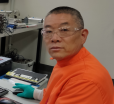Researchers from the University of New South Wales have developed a new type of rechargeable battery that uses protons as charge carriers, offering a safer and more environmentally friendly alternative to conventional lithium-ion batteries.
We are using nuclear and other methods to improve the traceability of food to ensure safety and security for consumers and industry, optimise the various functions of food and its production and understand the fundamental mechanisms that link some food to an immune response
Discover the many career opportunities in the nuclear industry on a special behind the scenes tour of ANSTO.

Principal Research Scientist, Manager - Spent Fuel Program (Nuclear Fuel Cycle)
Role at ANSTO

Sample Environments Group Leader
Role at ANSTO

Postdoctoral Research Fellow, Health research and Technology
Role at ANSTO

Board Member
Rear Admiral Richards served in the Royal Australian Navy for over 36 years, bringing extensive experience in engineering, operations, strategic leadership, nuclear safety and regulation. In recognition of her
Thirty years of ANSTO's unique capability in monitoring fine particle pollution provides insight on bushfire smoke.
Contributing to research that strengthens the defence of Australia
Meeting of minds about potential next-generation cancer treatment for Australians
Young ANSTO biomedical materials scientist will attend Nobel Laureate meeting.
ANSTO recently hosted a public Ask Us Anything event on nuclear medicine, sharing information on how we safely manufacture and distribute nuclear medicine across Australia each week to hundreds of hospitals and clinics.
Parents can use their NSW Government Creative Kids Voucher to pay for ANSTO's School Holiday workshops.
The Government is safeguarding Australia’s sovereign capability to produce vital nuclear medicines by launching a $30 million project to design a new world-leading manufacturing facility to be built at Lucas Heights in Sydney.
A large international team has provided an understanding of how nanoscale interactions affect the thermal stability of a type of next generation organic solar cells.
ANSTO is a unique national science organisation that began operating under its predecessor The Australian Atomic Energy Commission (AAEC) 70 years ago.
Research will change understanding of Australian Aboriginal rock art found in rock shelters of the Kimberley and its relationship to a changing landscape
Pagination







